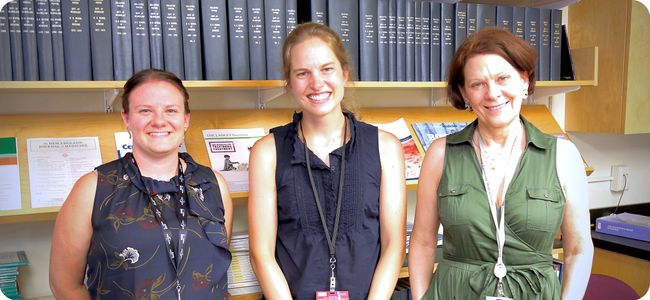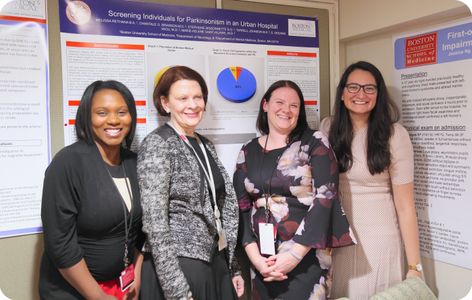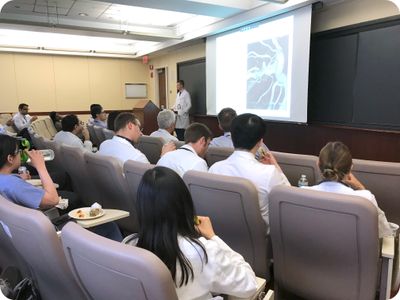Movement Disorder Fellowship
One- or two-year movement disorders subspecialty training positions in the Parkinson’s Disease and Movement Disorders Center of the Department of Neurology at the Boston University School of Medicine/Boston Medical Center (BUSM/BMC) are available beginning July of each calendar year.
This fellowship emphasizes clinical and research training in movement disorders. Opportunities for development of clinical expertise include: training for botulinum toxin injections; selection, evaluation and surgical treatment of movement disorders (including intraoperative clinical neurophysiology); and clinical training based on a large volume of patients with hyperkinetic and hypokinetic movement disorders.
Formal clinical or laboratory-based training is available in neuropharmacology, molecular biology, neuropsychology, neuroepidemiology, neuroimaging, neuropathology, animal models of neurodegenerative diseases, neurogenetics and clinical trials. Four full-time movement disorders clinical faculty provide clinical mentorship.

Description of the Fellowship
Goals and Objectives of the Fellowship
 To gain expertise in the recognition and diagnosis of movement disorders including Parkinson’s disease, atypical Parkinsonian disorders (MSA, CBGD, etc.), Huntington’s disease, Tourette’s Syndrome, tremor, chorea, athetosis, dystonia, ballism, myoclonus, tics, spasticity, rigidity, restless legs syndrome.
To gain expertise in the recognition and diagnosis of movement disorders including Parkinson’s disease, atypical Parkinsonian disorders (MSA, CBGD, etc.), Huntington’s disease, Tourette’s Syndrome, tremor, chorea, athetosis, dystonia, ballism, myoclonus, tics, spasticity, rigidity, restless legs syndrome.- To understand the biochemical, pharmacologic, genetic, and physiologic mechanisms of the movement disorders.
- To develop an understanding of the pharmacological, surgical, and supportive approaches used in the clinical management of movement disorders.
- To become familiar with genetic testing and counseling relevant to inherited movement disorders.
- To develop expertise with clinical rating scales used in the assessment of movement disorder patients, and in the conduct of clinical trials.
- To acquire basic skills in clinical or basic research relevant to movement disorders.
- To gain experience in the didactic teaching of movement disorders, including the effective use of multimedia modalities.
Fellowship Activities
The above goals are accomplished by a fellowship experience organized around the following areas of clinical training, research training and teaching opportunities in movement disorders:
Clinical Training
- Outpatient management of movement disorders under supervision of Faculty.
- Botulinum toxin injection of dystonia and other movement disorders.
- Inpatient Movement Disorders consultations. The Movement Disorders fellows evaluate all inpatient consultations and all patients with movements disorders admitted to the Neurology service at Boston Medical Center.
- Pre-surgical evaluation of Parkinson’s disease or tremor patients for deep brain stimulation of the subthalamic nucleus and thalamus. The Movement Disorder fellow is in integral part of the pre-surgical, intraoperative and post-surgical evaluative team.
- Participation in the Huntington’s Disease Clinic.
Research
- Clinical trials: participation as a clinical evaluator in one sponsored clinical trial in which a Faculty Member is Investigator.
- Research Project: In an area (clinical or laboratory-based) chosen by the Fellow with the assistance and supervision of a Faculty member.
Teaching

- The Movement Disorder Fellows are responsible for organizing the twice-monthly Movement disorder conference at which research and clinical presentations from B.U. and outside faculty occur, and the twice monthly video “case review” conference.
- Fellows also participate in a monthly Neurology resident and medical student didactic or case presentation Noon Conference.
How to Apply
Applicants must be graduates of a residency program in neurology accredited by the ACGME or the Royal College of Physicians and Surgeons of Canada (RCPSC). Applicants should be board certified or board eligible in Neurology.
If you are interested in applying for the 2026 Movement Disorder fellowship position, please register with the SF Match Movement Disorders Central Application Service (CAS). Further information about the SF Match process can be found here.
For more information please contact:
Marie-Hélène Saint Hilaire, MD, FRCP(C)
Program Director, Movement Disorders Fellowship
Department of Neurology
Boston University School of Medicine
85 East Concord Street, Ground Floor
Boston, MA 02118-2394
(617) 638-8640
neuromsh@bu.edu